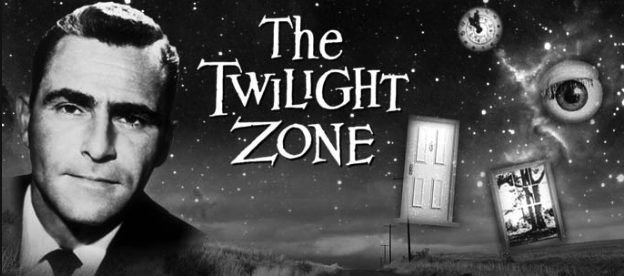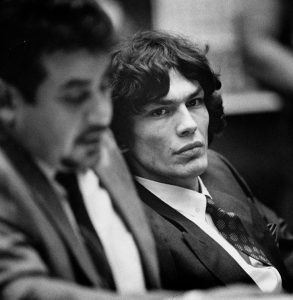I think it’s criminal that we are not permitted to make dramatic note of social evils that exist, of controversial themes as they are inherent in our society. I think it’s ridiculous that drama, which by its very nature should make a comment on those things which affect our daily lives, is in a position, at least in terms of television, of not being able to take that stand. —Rod Serling (1959)
Rod Serling, born Edwin Rodman Serling on December 25, 1924, would become one of America’s most important writers and producers of television dramas and screenplays primarily because of his vocal disapproval of censorship in the media. Before he began to seek new forms of media with minimal censorship, he was a successful writer for Playhouse 90, an American anthology drama. There, he wrote emmy-award winning scripts for “Patterns” (1955), a dramatization about corporate power, and “Requiem for a Heavyweight” (1956), which showed the struggles of a retired boxer in the aftermath of his 17-year career.1 However, it was Serling’s “A Town Has Turned to Dust” that would be his most controversial moment as part of the Playhouse 90 crew and would lead him into his next project as a writer. “A Town Has Turned to Dust” followed the story of Emmett Till, the young black boy brutally murdered in 1955 for allegedly whistling at a white woman in Mississippi. CBS decided to censor Serling’s script by making the black boy that was supposed to represent Till into a Mexican boy; they also made it seem as though it was the boy’s fault by depicting him as “getting out of line.”2 The network’s censorship removed many of the painful truths regarding the prejudices in America during this time. Serling would turn to the avenue of science fiction in order to escape this kind of censorship; in the words of Serling, “You know, you can put these words into the mouth of a Martian and get away with it.” Serling’s desire to get away from censored forms of media led to the creation of The Twilight Zone (1959-1964), a science fiction series that showcased people’s greatest fears ranging from alien invasion, death, ghosts, and even the effects of the Cold War on American society.3

Along with his criticism towards racial prejudice, Serling had his objections to the Cold War. The themes of the Cold War were largely absent from sitcoms and dramas during the 1950s; however, the episodes of The Twilight Zone, titled “The Shelter” (1961) and “Third from the Sun” (1960), discuss the effects of the Cold War head-on.4 In these two episodes, Serling brings forth the fears of the American people that were prevalent during the Cold War era (1945-1991) in terms of the overall anxiety and anticipation for a nuclear holocaust as well as the effects that the arms race had on the American psyche.
“Third from the Sun” deals more directly with the arms race and the creation of the hydrogen bomb. It was believed that the Americans were the only ones in possession of the atomic bomb; however, in 1949, the Soviets tested their first atomic bomb leading Truman to begin the quest for creating a more powerful bomb—the hydrogen bomb.5 Before the creation of this bomb, many people questioned the necessity of it. Would America win the arms race and would that be the end of it? Or would Russia create a hydrogen bomb as well? To address this question with our knowledge now, when the United States created the first hydrogen bomb in 1952, the Soviets followed suit with the creation of their first hydrogen bomb in 1955.6 Now, two nations were in possession of the world’s most powerful bomb. As Harold C. Urey stated, “Suppose that two countries have the hydrogen bomb…I would say that the probability that a war will start is increased if two groups each believe that they can win that war.”7 With the creation of the hydrogen bomb in both the U.S. and Russia, both countries were capable of obliterating the other. This is seen in “Third from the Sun” when Will Sturka, a scientist that works on hydrogen bomb production, learns from a suspicious coworker that the company planned on setting off a bomb in 48 hours. With this information, Sturka and his friend, Jerry Riden, a pilot of an experimental spacecraft, decided that it was time to move to Earth, the third planet from the Sun, in order to save their family from a nuclear holocaust. Hypothetically, we see that in the case of a nuclear holocaust, due to the mass destruction and horrors that a hydrogen bomb would produce, moving to another planet would be the best option. However, how many people have that option? Serling questions the necessity of using a hydrogen bomb because in the end, no one wins and all it brings is devastation and death.8

In relation, “The Shelter” shows the anxiety and hysteria that laid within the minds of the American people, knowing that at any moment, the enemy could drop a bomb on America and everything would change. In this episode, Dr. Stockton’s birthday party was interrupted by a radio announcement that there was a detection of a UFO, most likely missiles, en route to the U.S. and everyone is advised to seek shelter. Out of all the people present at the party, Dr. Stockton was the only one who had a shelter prepared. While everyone frantically ran to their houses to figure out what to do, Dr. Stockton and his family started to collect water, food, and things for entertainment into the shelter. The neighbors began to come back to Dr. Stockton’s house and tried to guilt him into letting them stay in his shelter with his family; however, the shelter could efficiently protect only three people. After the doctor refuses to allow any of the neighbors into his shelter, the neighbors try to break into the shelter in their last attempt to save themselves. At the end of the show, the advisory is called off and the friends of Dr. Stockton are ashamed that they put him and his family’s lives in danger because they were not prepared for a missile attack. Serling is sending a powerful message about the unpleasant aspects of human nature that can occur in life-or-death situations, as well as the importance of being prepared for this worst (even though people did not want to think about it).9

From these two episodes of The Twilight Zone, we see the ugly tendencies of human nature in regards to selfishness during a crisis in order to save one’s self, the unfortunate willingness of countries to bring another country to complete destruction via hydrogen bomb, and the importance of disaster preparedness. If Serling had tried to write these scripts for Playhouse 90, the messages would most likely have been completely distorted by the network’s need to censor material in order to protect their interests. The beauty of The Twilight Zone came from the fact that Serling could deliver powerful, uncensored messages in a half-hour span, delving into people’s worst fears and opening their eyes to the harsh reality that was bestowed upon them.

In 1964, after airing one-hundred-fifty-six episodes, The Twilight Zone was cancelled and Serling took to the lecture circuit where he delivered speeches to crowds in which he was able to speak more freely and openly. Just as Serling showed his disapproval for the Cold War in these two episodes of The Twilight Zone, he often talked about his disapproval for the Vietnam War in his lectures: “America’s destiny…lies on the streets of Newark, Miami, Chicago, Los Angeles and Harlem…not in Saigon. And certainly not at the cost of twenty-thousand dead American boys.” 10 In his lectures, Serling did not have to put these words into the mouth of a martian. Through his lectures, Serling was now able to express the emotions that so many Americans felt during times of war in a more direct way—without the necessity of crafting a masterful thirty-minute, science-fiction episode just to escape the scrutiny of media censorship.
- Encyclopedia Britannica, 2016, s.v. “Rod Serling.” ↵
- Meredith Brenner, “Thirty Minute Reality Check: How The Twilight Zone Reflected American Society in the 1950s,” (Thesis, University of Maryland, College Park, 2004), 1. ↵
- Meredith Brenner, “Thirty Minute Reality Check: How The Twilight Zone Reflected American Society in the 1950s,” (Thesis, University of Maryland, College Park, 2004), 1. ↵
- Heather Lunney, “Exploring the Cold War through The Twilight Zone: Five episodes in a journey to a dimension of sight, sound and mind,” History in the Making Vol. 3, no. 1 (2014): 40. ↵
- Richard Dean Burns and Joseph M. Siracusa, A Global History of the Nuclear Arms Race: Weapons, Strategy, and Politics 2 Volumes: Weapons, Strategy, and Politics (Santa Barbara, CA: Praeger, 2013), 37. ↵
- Richard Dean Burns and Joseph M. Siracusa, A Global History of the Nuclear Arms Race: Weapons, Strategy, and Politics 2 Volumes: Weapons, Strategy, and Politics (Santa Barbara, CA: Praeger, 2013), 34. ↵
- Harold C. Urey, “Should America Build the H-Bomb?,” Bulletin of the Atomic Scientists, March 1, 1950, 73. ↵
- “The Shelter,” The Twilight Zone, directed by Lamont Johnson (Los Angeles: CBS, 1960). ↵
- “The Shelter,” The Twilight Zone, directed by Lamont Johnson (Los Angeles: CBS, 1961). ↵
- Rod Serling (lecture presented at Moorpark College, Moorpark, CA, December 3, 1968). ↵



76 comments
Sarah Mares
When I was younger, I used to enjoy watching the Twilight Zone with my grandmother and she would explain to me what she recalled from the times of the show’s live airings. Most of the time I found the Twilight Zone entertaining because it was scary and suspenseful and I love things like that. Little did I know, Rod Serling was doing his best in getting his uncensored messages about society and politics out to the world via the world of sci-fi and finding just enough scare people.
Joshua Breard
Rod Sterling was well wise beyond his years. He had so many hidden messages through his creation of the Twilight Zone series. It is especially clear in the episodes mentioned (The Shelter and The Third from the Sun) about his disapproval of both the Cold War and Vietnam war. I do agree with him on how America should have been focused on fixing Harlem, Los Angeles, Chicago, and so on and so forth but it leaves me to question how much empathy he had for the soldiers who would risk their lives on the battlefield. If his empathy for them was lost then he is no better than all other Americans who treated the soldiers horribly upon their return to the United States.
Briana Bustamante
Excellent article. I often hear my parents talk about The Twilight Zone. They would often watch the shows when they were growing up. You did an excellent job presenting the information on Rod Serling. He was a man before his time, speaking out on censorship. I wonder what Rod Serling would say today
about the accusations of “fake” news or “altered facts”!
Sergio Cervantes
An interesting article! It shows how important the television was in broadcasting controversial topics to the American public. I had heard of Serling but never knew that he spoke about nuclear holocausts nor the Vietnam War. It is fascinating to read about America’s past and the environment of the 50’s. After having read the titles of the two episodes, it provoked me to search for these online and watch them. I will say that they do make you think and I can’t possibly imagine the different emotions numerous Americans felt when they were watching this.
Nahim Rancharan
This was a very interesting article; even more so entertaining given that I knew very little about the Twilight Zone or Rod Serling. However, I think that it accurately highlights the power of the Media in helping to shape our views about current issues that exist in our societies. Screenwriters such as Rod Serling have the power to highlight certain issues, ideas and feelings that are not focused upon by other Media outlets. Although some of his work has been censored to protect certain established societal views, I found it interesting that Rod Serling was able to find a way to get his message across, the way he intended it to, which is very ingenious. Good Job on the article.
Alejandro Garza
Very interesting article! I’ve always been interested in the Twilight Zone series, and learning that it found its roots in being a medium for Rod Serling to express his views uncensored by the media. The various scenarios depicted by the series, especially those of the Cold War in “The Shelter” and “Third from the Sun” are all unique and interesting topics for a science-fiction series to cover and are what i believe led to the success of the Twilight Zone as a series.
Bailey Rider
This was an excellent article and I learned a lot from it. I love that Rod Serling tried to talk about important problems such as race, the Cold War, and censorship. It’s sad that television altered his portrayal of racism to turn it into something less “offensive” and I am glad that he realized that through “The Twilight Zone” he could still get important life lessons and information across. The idea of censorship is controversial and I am happy that he could bring it up. Thank you for such an informative article!
Tyler Sleeter
Very informative article. I have been a fan of the Twilight Zone for many years, but I did not realize that Rod Serling began the show as a way to avoid censorship by the networks. I have always found his shows to be full of insight into the human condition as well as a little creepy. I was not aware that Serling went on a lecture circuit after the show ended to educate people on the conditions in America in a straightforward way.
Aimee Trevino
Awesome article! I personally do enjoy watching The Twilight Zone, because it does have interesting concepts and makes you think a little more than other shows. Anyways, the way the media would alter his ideas, and screen certain things is disgusting. Crazy to see how those ideals of screening television might still be being brought back today. I like how you described his original version and compared it to real life scenarios, and then explained how the media changed it so as to not “look bad”.
Nelson Smithwick
I’ve always been a fan of the great science-fiction stories of the Twilight Zone, but i never knew that it was an avenue for the creator to get around censorship. Going against censorship at this time was a very dangerous thing to do for a creator’s career, so this was a very courageous undertaking for Rod Sterling, and luckily it was a success so that we would have this great television program today.